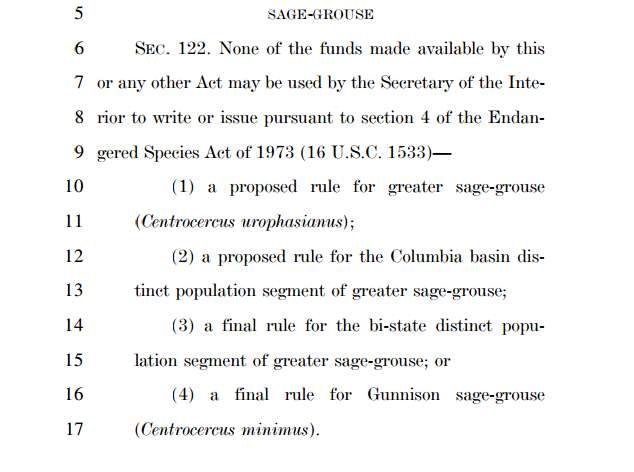Lately, we’ve seen Congress target many things: Science funding at NSF, school lunch, and the EPA’s ability to function, but I believe this is the first time I’ve seen Congress target a bird.
In the current draft of the omnibus bill Congress is obligated to pass this week to prevent a government shutdown, a small but significant 13 lines of text was added:

These few lines of text that have been attached to the cromnibus bill will have major implications for the protection of the sage grouse, a threatened species under the Endangered Species Act.
To be clear, this is blatant, unobscured interference in science-based policy. In adding this provision, members of Congress are choosing to override the scientific process of the Endangered Species Act and eliminate sage grouse species from being eligible for protection. Adding fuel to the fire, this “policy rider” might decrease the level of protection the sage grouse already has by removing incentives for state and local officials to protect the sage grouse now that they know any potential federal action will be delayed.

The Gunnison sage-grouse, which is found only in Southwest Colorado and Southeastern Utah, is considered threatened under the Endangered Species Act. Photo: FWS
Ironically, the Endangered Species Act was designed specifically to prevent this type of action. The species listings were mandated to be based on the science, not on political or economic interests. This provision would prevent that. (Also of note, this isn’t the first time the sage grouse listing has run into politics.)
The bottom line is that the provision sets a bad precedent. Should we be able to pick and choose which species can get protection based on how inconvenient their habitats are? It seems the sage grouse will now be a victim of political interests overriding science.
Importantly, the sage grouse provision is only one of many riders in the cromnibus bill that could undermine science-based policies. As one Congressional aide put it, if a bill with these riders passes, it shows that ultimately, Congressional leaders “can use must-pass legislation to repeal the regulatory state.”
